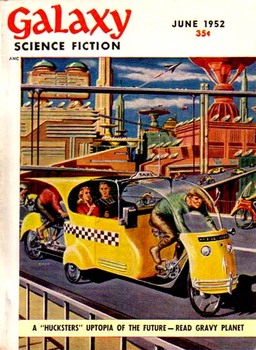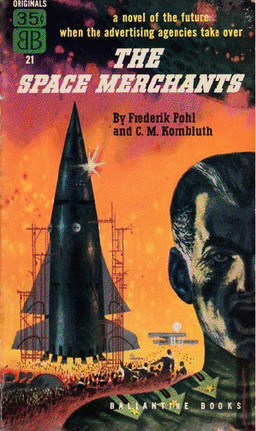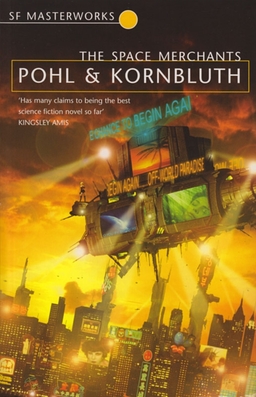Galaxy Science Fiction, June 1952: A Retro-Review
 The June, 1952 issue of Galaxy is another good one. It included six pieces of fiction and a science article by Willy Ley.
The June, 1952 issue of Galaxy is another good one. It included six pieces of fiction and a science article by Willy Ley.
“Gravy Planet” (Part 1) by Frederik Pohl and C.M. Kornbluth — Mitch Courtenay works at Fowler Shocken, the top ad agency in the world. And now, the agency has its eyes on the possibility of colonizing Venus with governmental approval to exclusively profit from the venture. Fowler Shocken chooses Mitch as chairman of the Venus Section, leaving Mitch to all the details around drawing public interest to going to Venus and actually making it hospitable.
Besides his work duties, Mitch tries to revive his failing marriage. His wife is a talented surgeon, but she’s seen Mitch try to pull her away from her career to become a housewife. With the news of his advancement, she’s willing to date him again, albeit with boundaries.
As if the stress of the campaign and a sinking love life isn’t enough, Mitch becomes a target. He narrowly survives two attempts on his life, and the private sector detectives aren’t much help. He pursues the man likely responsible for the attempts (along with sabotages to the Venus campaign), tracking him to Antarctica. Unfortunately for Mitch, he’s heading straight into an ambush.
“Gravy Planet” was published as a novel under the title The Space Merchants in 1953. It moves very well, and the futuristic world the authors seems close to modern in 2015. It doesn’t try to turn Venus into an Earth-like planet, but it’s not quite as inhospitable to life as we know it presently. (The Mariner 2 probe sent to Venus in 1962 measured surface temperature among other data, so the authors didn’t have access to all of that information.) Letting the details about Venus go, this novel (so far) is a great ride.
 “The Highest Mountain” by Bryce Walton — Bruce and his team explore Mars. Their ship is stationed alongside several others that have been mysteriously abandoned. The ships all rest before an enormous mountain that stretches far above. After Bruce kills one of his teammates, rambling about wild ideas against society, the team leaves him behind to record their mission. They explore the mountain to search for the lost crew members and satisfy their own egos for scaling something so immense.
“The Highest Mountain” by Bryce Walton — Bruce and his team explore Mars. Their ship is stationed alongside several others that have been mysteriously abandoned. The ships all rest before an enormous mountain that stretches far above. After Bruce kills one of his teammates, rambling about wild ideas against society, the team leaves him behind to record their mission. They explore the mountain to search for the lost crew members and satisfy their own egos for scaling something so immense.
I liked the unpredictability of this story and its ending. At times, I wondered if the pro-society crew members were too extreme in their views, but that might not be out of character in oppressive societies. Walton also wrote screenplays for the television show Alfred Hitchcock Presents.
“Orphans of the Void” by Michael Shaara — Captain Steffens and his crew explore the Tyban solar system. They find the third planet populated by millions of robots. The robots are telepathic, in the likeness of their makers, who are nowhere to be found. Yet the robots continue to await the return of their makers, for their longing to serve is their primary function.
This was a marvelous tale of first encounters. It plays out well, with a touch of sadness that leads to great hope. Besides writing science fiction stories, Shaara also wrote a novel, “The Killer Angels,” about the Battle of Gettysburg, for which he won the Pulitzer Prize for Fiction in 1975.
“Shipping Clerk” by William Morrison — Ollie Keith lives on the streets, searching through refuse for anything edible. He finds a nut on the ground and tries to crack it with his teeth, only to accidentally swallow it whole. From that moment on, he finds his appetite insatiable, going so far as to ingest hundreds of eggs in an eating contest without relief to his hunger pangs.
Morrison’s story is light and entertaining. It has a nice feel of humor to it, kind of like watching Leave it to Beaver.
“The Hoaxters” by Richard Wilson — Sam and Alex are mining rock on an asteroid, searching for an elusive mineral. For months, they’ve followed a monotonous, daily routine, capped with the same report: “All well. Progress nil.” Longing for something to happen, the two concoct a story that the only life forms on the asteroid – tiny, bug-like creatures that lay dormant in the rock – begin an assault on the research station. Surely the false report will bring relief to their boredom, even if it risks their reputations.
 This was my favorite story of the issue. I loved that it became a story about crying wolf, yet they reference that fable and realize their own dilemma. I hope I’m not spoiling anything by mentioning this aspect. Trust me that this is one to check out.
This was my favorite story of the issue. I loved that it became a story about crying wolf, yet they reference that fable and realize their own dilemma. I hope I’m not spoiling anything by mentioning this aspect. Trust me that this is one to check out.
“The Luckiest Man in Denv” by Simon Eisner — May’s man Reuben serves his general well, trying to earn his way above the 83rd level to the more luxurious dwellings of the upper floors. But a rival general is setting Reuben up to be replaced by a double in order to discredit May. Reuben works with the general to uncover the plot, hoping to retain May’s honor and save his own life.
I understood the dystopia the author was using, and it had some interesting aspects. But I had trouble really getting attached to the plot; the world just felt too distant, in general. Toward the end, it started to feel like it might go toward something more grounded, but then that was ripped away to give more of a twist ending. Not that the twist itself was bad, but I just wish I had been more grounded in the story to begin with.
In a way, Galaxy ended this issue with its own twist, for Simon Eisner is actually a pseudonym for an author already in the issue — C. M. Kornbluth. So far, this is the first time I’ve encountered an author with two stories in the same issue of Galaxy.
I’m curious if there are other instances of this elsewhere in the magazine’s history. Does anyone have an answer for that bit of trivia?
Matthew Wuertz’s last retro review for us was the April 1952 issue of Galaxy Science Fiction.
Indeed there were other cases where Galaxy featured two stories by the same writer under different names.
For one quick example, December 1954, with “Skulking Permit” by Robert Sheckley, and “Uncle Tom’s Planet”, by “Finn O’Donnevan”, who was also Robert Sheckley. Sheckley and “O’Donnevan” also both appeared in the June 1958 issue.
That was a fairly common thing for very prolific writers to do when they had two stories in the same issue of a magazine. Robert Silverberg had as many as three stories in a single issue of Super Science Fiction later in the ’50s, all under different names. It happened as late as in the 70s: John Varley had two stories in the very first issue of Asimov’s SF (Spring 1977), “Goodbye Robinson Crusoe” under his name, and the much better known “Air Raid”, a Hugo nominee, as by “Herb Boehm”. (“Air Raid” became the novel MILLENNIUM, published as by Varley, and later a movie.)
Rich, it’s an interesting “trick” to pull off, making the magazine seem more diverse than it really is.
I am a bit behind again…I have finished May and most of June, while my new On Spec and a long neglected Lovecraft anthology taunt me from my reading table. The new F&SF is probably not far off, new editor and all. My new addiction to the Knights of the Dinner Table comics is not helping either. I will respond to the ones I have read so far and finish in a day or two.
I also have just a few stories left to finish the last issue of Black Gate. I have read every issue in order and I am almost done. It is an excellent magazine…have you heard of it?
Matthew: can you post a link here to your review of May 1952 so I can add my thoughts there too? I know you have done this before, so you have my apologies and thanks at the same time
So anyhoo, I am loving Gravy Planet. Social drama and speculation usually bore me to tears, but this is a fun ride. I have always enjoyed everything by these two authors (we lost Mr. Kornbluth way too soon). I was expecting the usual Part One ending where our hero is in the rocket ready to head out on his adventure, but instead he got derailed in rather dramatic fashion. Alistair Maclean proved that you can have an almost other-worldly experience without leaving earth (Ice Station Zebra), and this was reminiscent of his work.
Actually, Ice Station Zebra was ten written ten years later than Gravy Planet.
I did enjoy “The Highest Mountain.” Once again, an author packs a novel’s worth of ideas into a short story. I would love to have creativity to spare on that scale. The mystery and tension of the failed attempts to climb, or at least return from the summit, are compelling. The resolution was believable and a fitting climax to all of the confusion.
Matthew, I appreciate your research into the authors. I see a lot of names in these stories that I have not previously known.
For example, Mr. Shaara won a pulitzer prize! Cool!
His story “Orphans of the Void,” was, to me, a classic study of artificial intelligence and emotion, and speculation about man’s relationship to robots. I felt real pity towards these beings who perpetuated their society (?) and longed to serve their creators, who were long gone. The bittersweet, but mostly sad, ending would make any scifi fan consider how he or she would handle this lost colony of robots.
See you in a day or two. Lovecraft beckons. So do B.A., Bob, Dave, Sarah, and Brian.
Gus, the May review is here: http://www.blackgate.com/2012/09/09/galaxy-science-fiction-may-1952-a-retro-review/
Thanks for your comments. I understand getting behind in reading. So much to read…
Yeah, I have great expectations for “Gravy Planet”. Good stuff there.
After you finish the last issue of Black Gate, you’ll have to search this site for all of the online fiction.
I did enjoy “Shipping Clerk” and found it amusing, but more like Gilligan’s Island than Leave it to Beaver I don’t mind reading lighter works like this once in a while. It allows my brain to get ready for the next heavy and thoughtful story. It was clear to me what was going on with this poor fellow who suffered from hunger and serious stomach pains through most of the story. Ah well, as long as it is for my entertainment I suppose.
I don’t mind reading lighter works like this once in a while. It allows my brain to get ready for the next heavy and thoughtful story. It was clear to me what was going on with this poor fellow who suffered from hunger and serious stomach pains through most of the story. Ah well, as long as it is for my entertainment I suppose.
“The Hoaxters” was not my favorite (Gravy Planet), but it was fun to watch these two men suffer (what is WRONG with me?) and then entertain themselves with some pretty hard core mischief. I once caused a school official to return early from a trip to Germany with a practical joke of my own in real life, but that is nothing compared to what these two guys did! And, of COURSE the problem they were faking ended up becoming real. I agree that this is one to read for those who have this back issue on their shelf. I was happy to see them learn an efficient way to do their mining as a result of their research (research?), and they can keep their success a secret as kind of a final show of mischief.
I am sorry to learn the C.M. Kornbluth wrote “Denv,” because I have never read anything by him that I did not enjoy. Now I have. The story was hard to follow and the sprawling, post war cityscape did not make much sense to me. This might have been better as a novelet, with a little more background and explanation.
Thanks again! I only have two issues of Galaxy left to complete my collection, so I’ll be trolling ebay pretty hard for the next month. Wow, that 1980 issue is hard to find. See you next month.
Gus, you only have two issues left to complete your collection? Wow, you are far ahead of me. I’ve got everything through 1953, and then it gets spotty. But my wife usually gets me a few issues to fill in the gaps for birthday or Christmas presents.
[…] as a novel under the title The Space Merchants in 1953. The first two installments appeared in the June and July […]